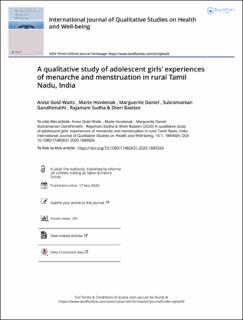| dc.contributor.author | Gold-Watts, Anise | |
| dc.contributor.author | Hovdenak, Marte | |
| dc.contributor.author | Daniel, Marguerite | |
| dc.contributor.author | Gandhimathi, Subramanian | |
| dc.contributor.author | Sudha, Rajamani | |
| dc.contributor.author | Bastien, Sheri | |
| dc.date.accessioned | 2021-05-04T07:35:09Z | |
| dc.date.available | 2021-05-04T07:35:09Z | |
| dc.date.created | 2020-10-31T15:40:19Z | |
| dc.date.issued | 2020 | |
| dc.Published | International Journal of Qualitative Studies on Health and Well-being. 2020, 15:1845924 (1), 1-15. | |
| dc.identifier.issn | 1748-2623 | |
| dc.identifier.uri | https://hdl.handle.net/11250/2753391 | |
| dc.description.abstract | Background: In low- and middle-income countries, women and girls experience menstrual hygiene management-related health and social challenges such as urinary tract infections, social stigma, and school and workplace absenteeism.
Purpose: In this study, we sought to explore how adolescent girls in rural Thirumalaikodi, Tamil Nadu, India experience menarche and menstruation, how their experiences connect to the sociocultural context, and what strategies they use to manage menstruation. This study also informed the adaptation and development of a school-based water, sanitation, and hygiene intervention.
Methods: We conducted ten semi-structured qualitative interviews with adolescent girls in ninth standard from June-July 2018. Data were analysed using a thematic network approach.
Results: Findings revealed that menarche inaugurates biological transitions of puberty and cultural codes that shape gender norms. Gender norms in turn generate, maintain, and reproduce stigmatizing attitudes, beliefs, and practices that influenced the development of coping mechanisms at home and at school. Resulting adaptations to the intervention consisted of two activities (school lesson and an extracurricular activity) that address knowledge gaps and myths.
Conclusions: This study demonstrates the importance of qualitative research in unpacking adolescent girls’ experiences with menarche and menstruation. Study findings also show how formative research can contribute to the adaptation and development of a contextually and culturally-relevant water, sanitation, and hygiene intervention. | en_US |
| dc.language.iso | eng | en_US |
| dc.publisher | Taylor and Francis | en_US |
| dc.rights | Navngivelse 4.0 Internasjonal | * |
| dc.rights.uri | http://creativecommons.org/licenses/by/4.0/deed.no | * |
| dc.title | A qualitative study of adolescent girls’ experiences of menarche and menstruation in rural Tamil Nadu, India | en_US |
| dc.type | Journal article | en_US |
| dc.type | Peer reviewed | en_US |
| dc.description.version | publishedVersion | en_US |
| dc.rights.holder | Copyright 2020 The Author(s). | en_US |
| dc.source.articlenumber | 1845924 | en_US |
| cristin.ispublished | true | |
| cristin.fulltext | original | |
| cristin.qualitycode | 1 | |
| dc.identifier.doi | 10.1080/17482631.2020.1845924 | |
| dc.identifier.cristin | 1843819 | |
| dc.source.journal | International Journal of Qualitative Studies on Health and Well-being | en_US |
| dc.source.40 | 15:1845924 | |
| dc.source.14 | 1 | |
| dc.identifier.citation | International Journal of Qualitative Studies on Health and Well-being. 2020, 15 (1), 1845924. | en_US |
| dc.source.volume | 15 | en_US |
| dc.source.issue | 1 | en_US |

